

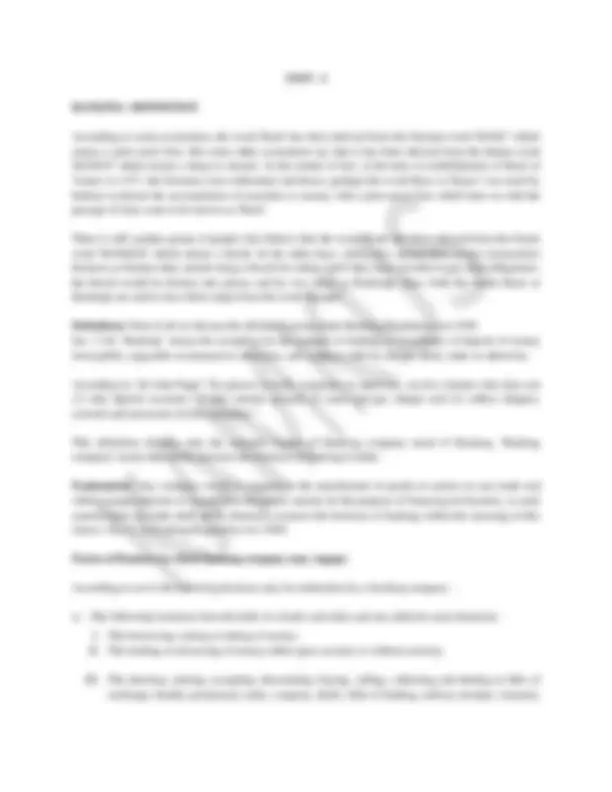
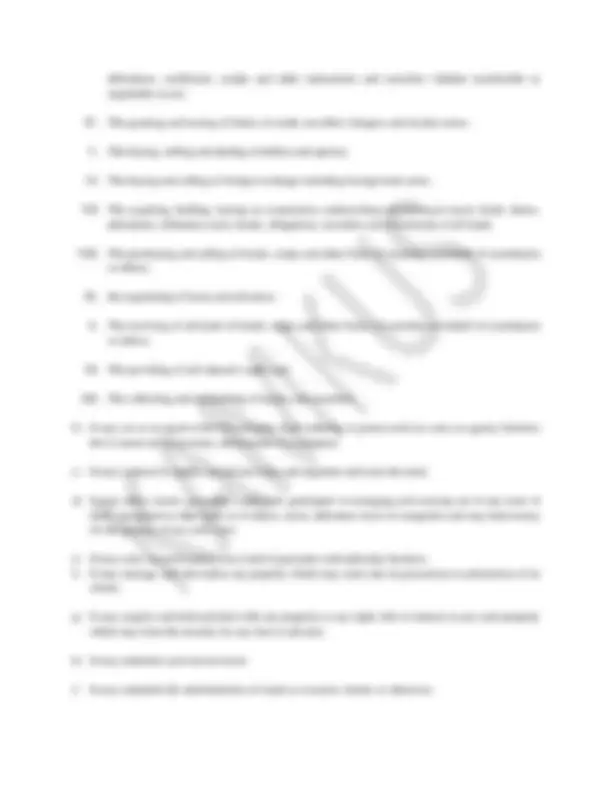
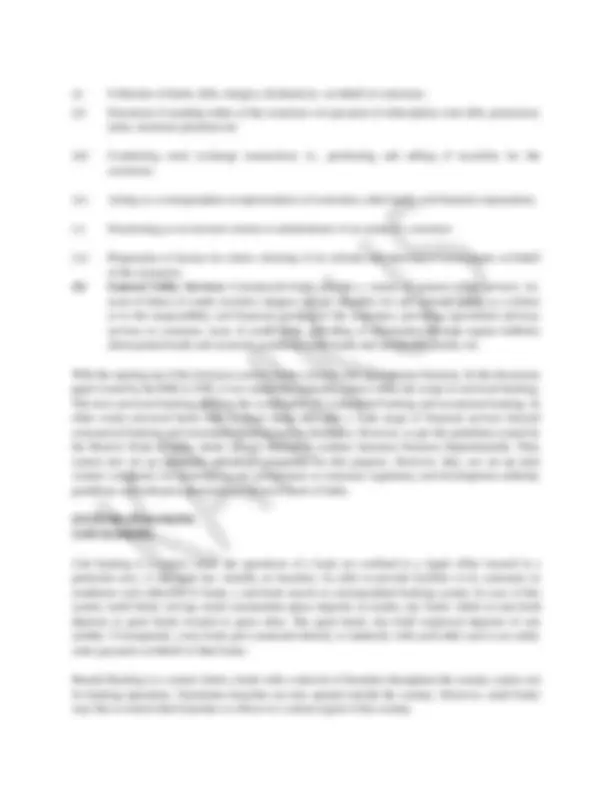
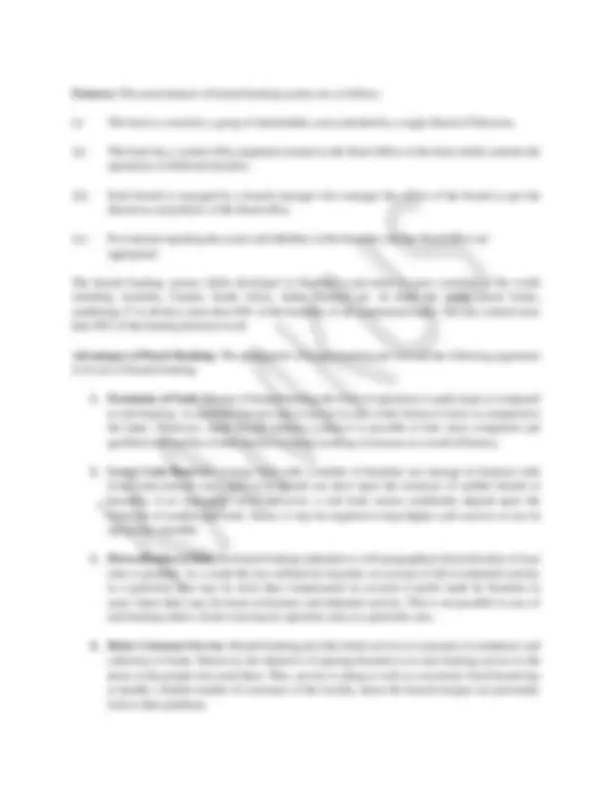
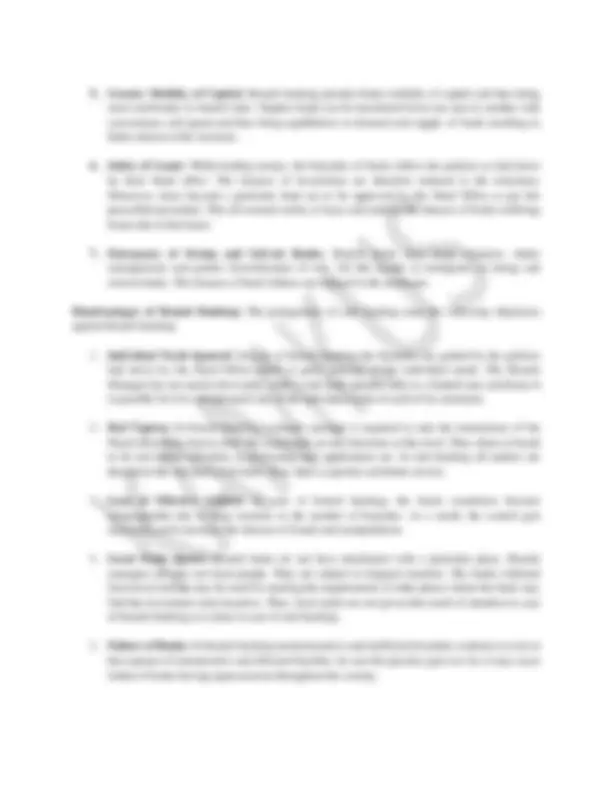

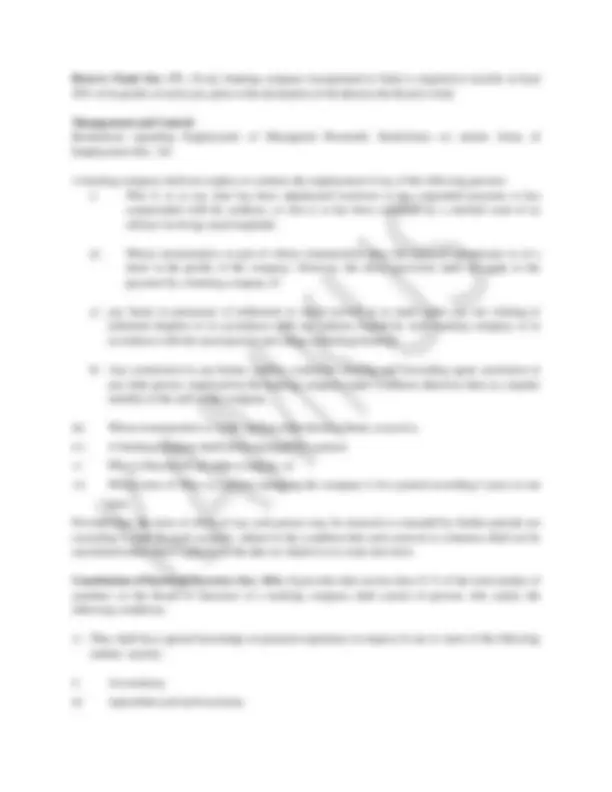
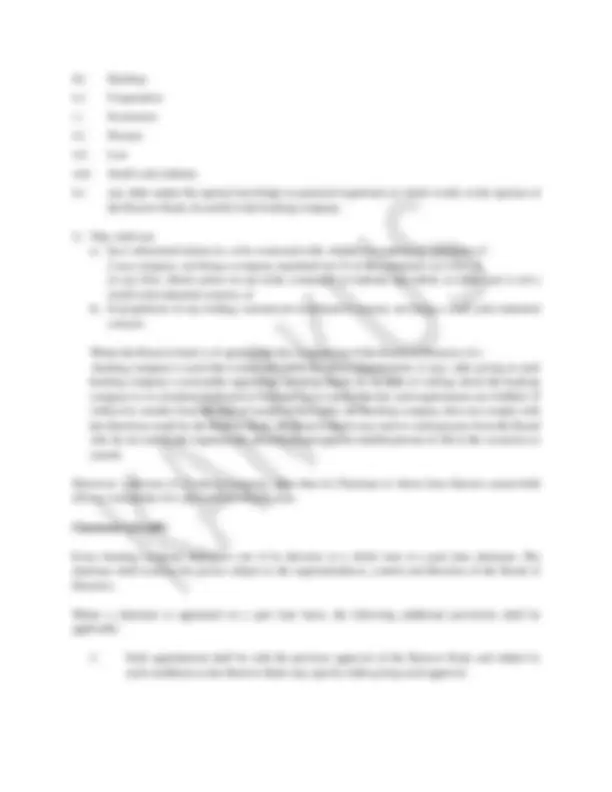
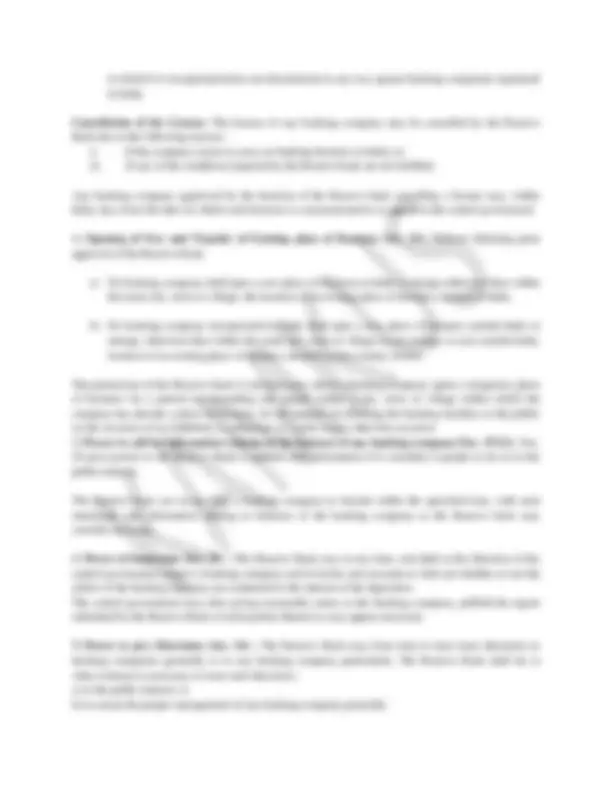
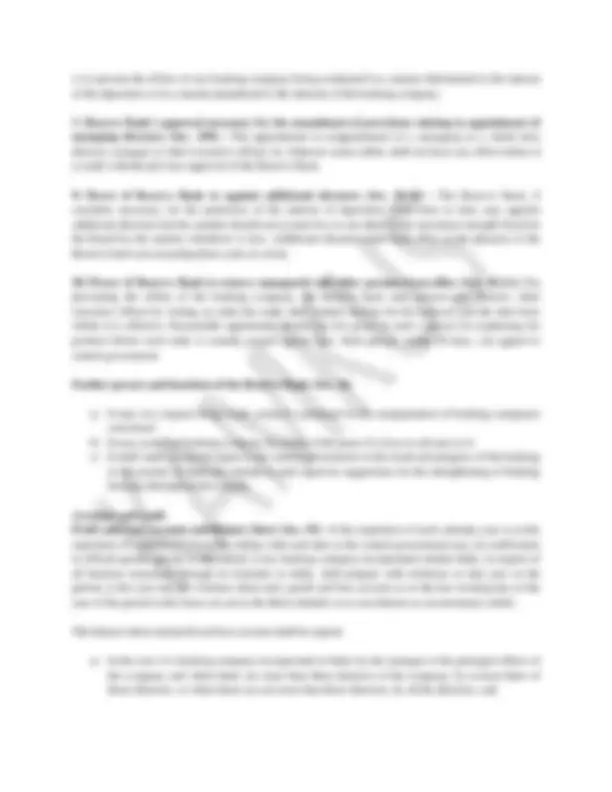
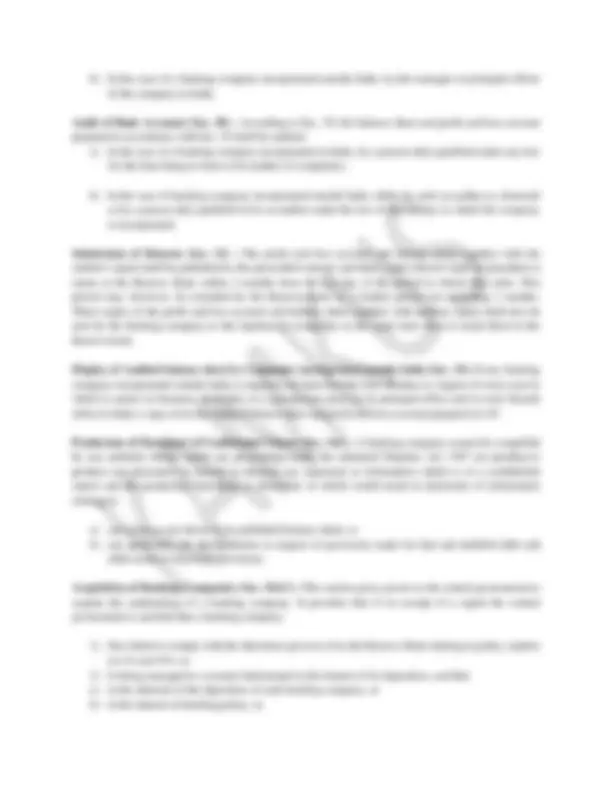
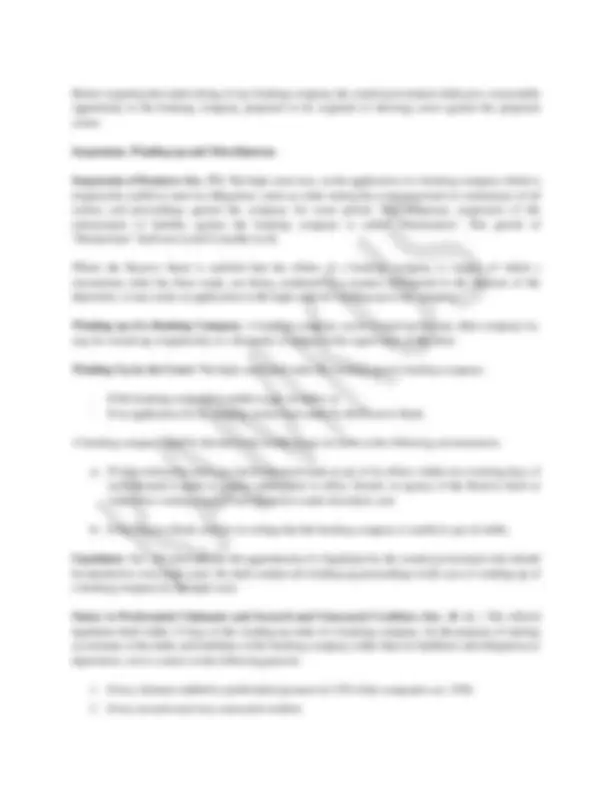
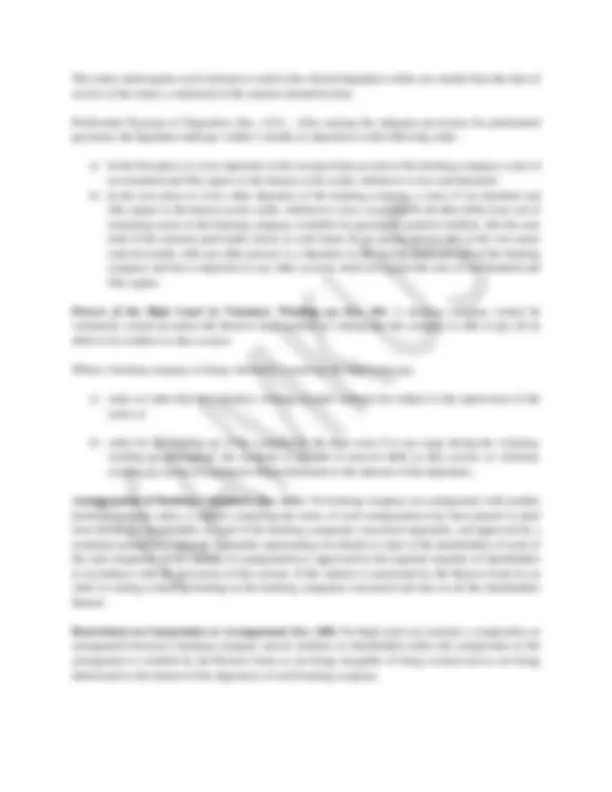
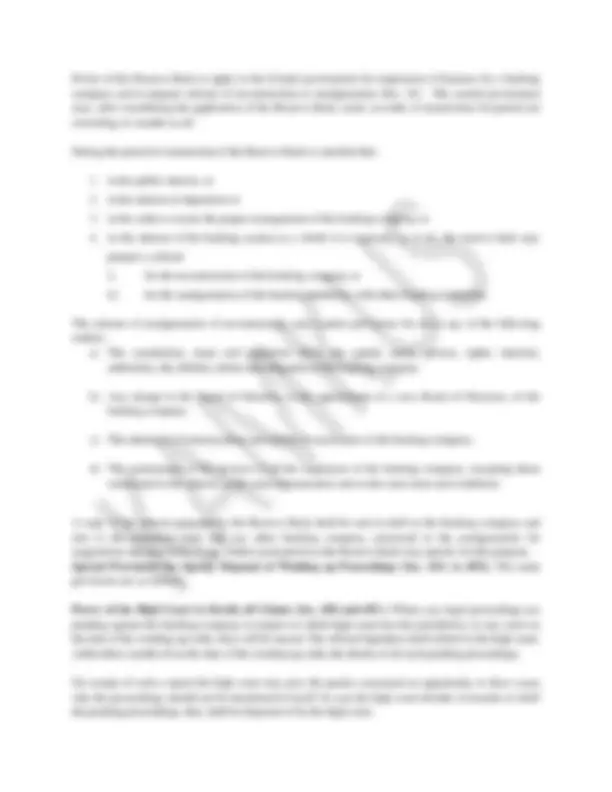
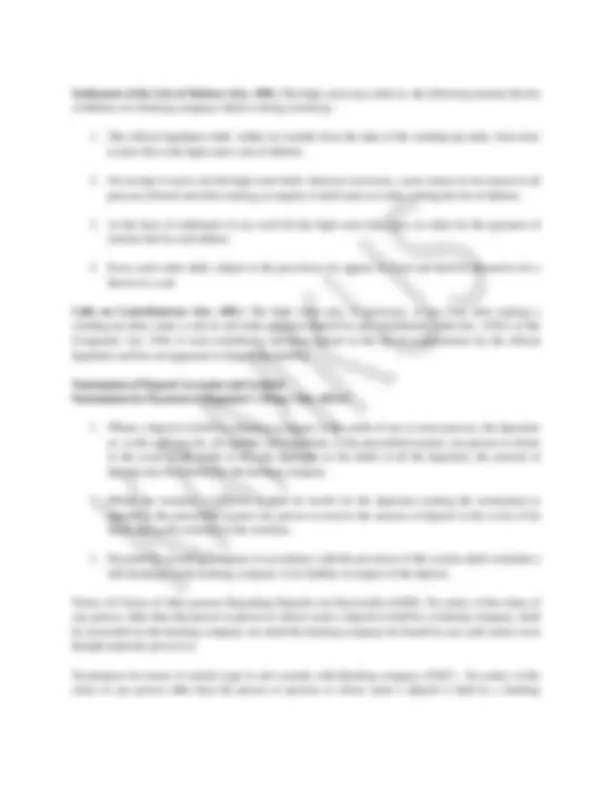
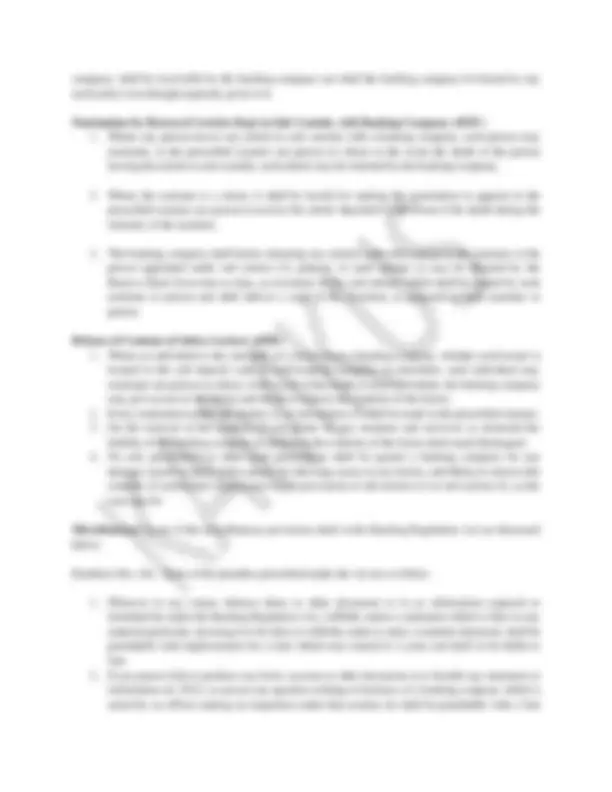
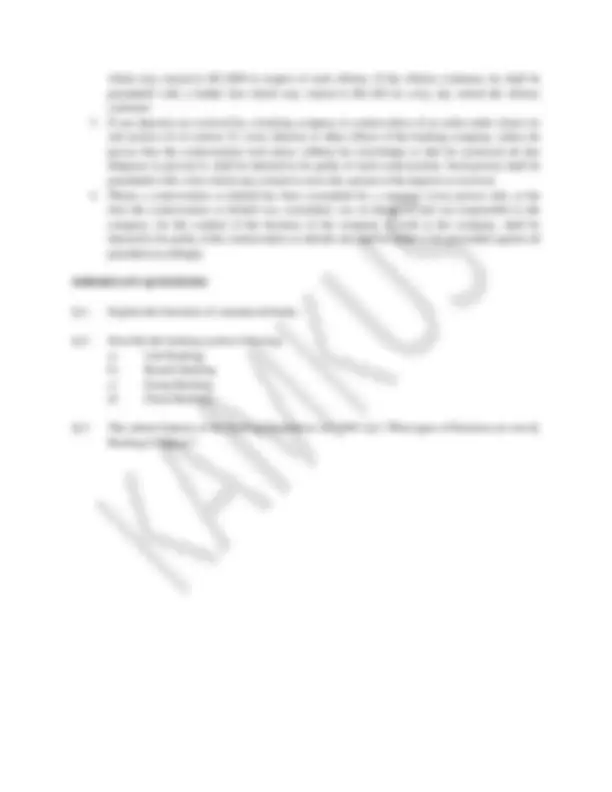
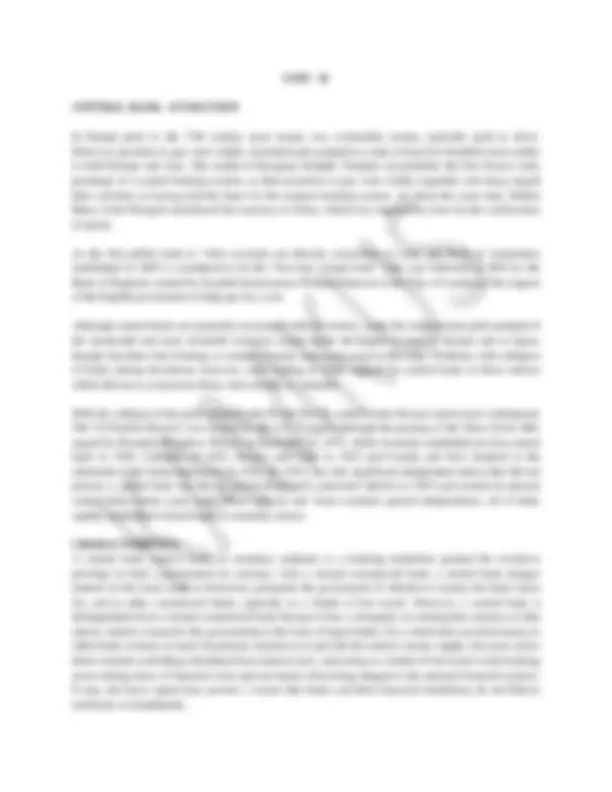
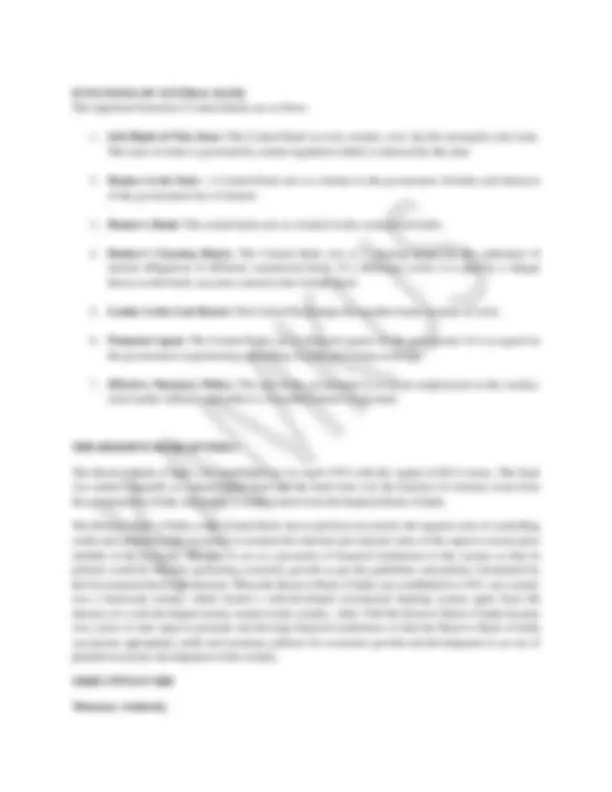

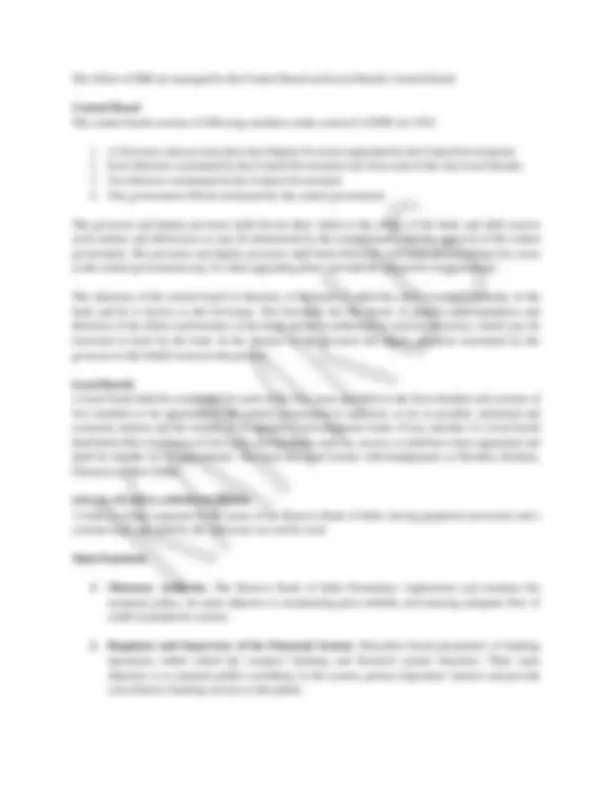
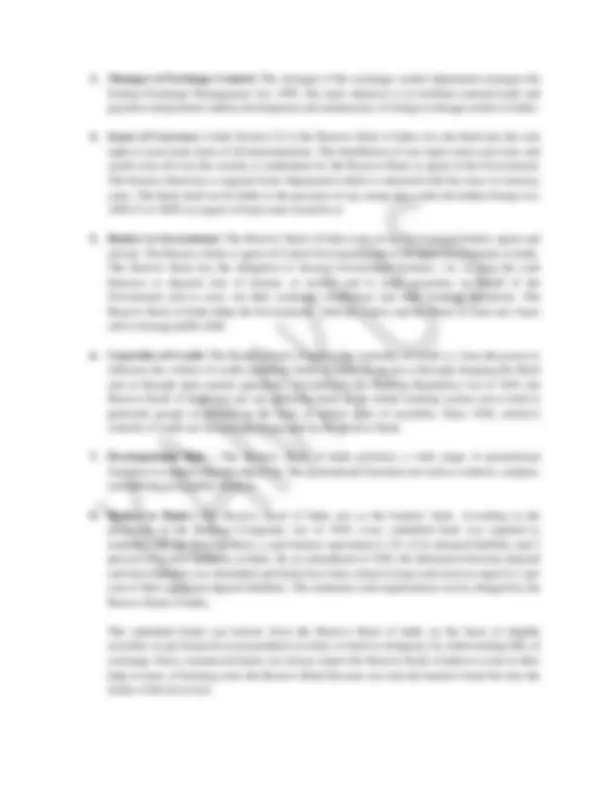
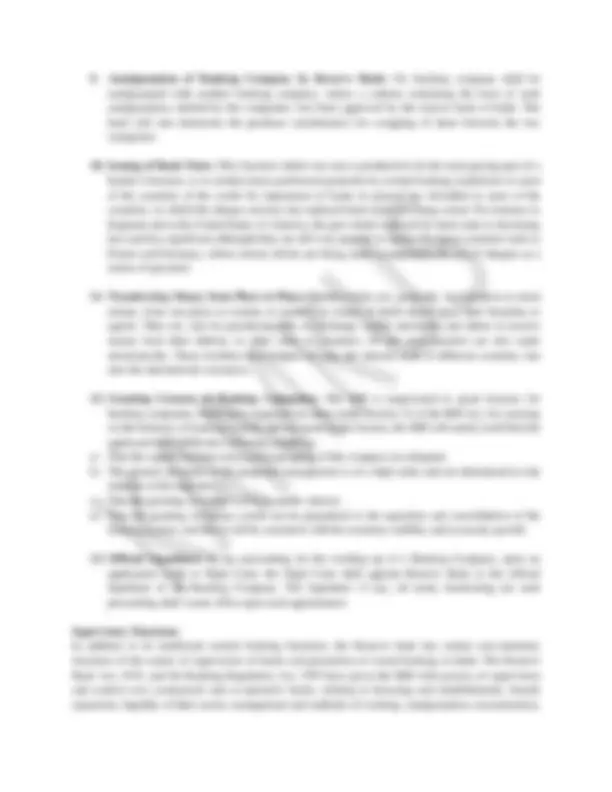
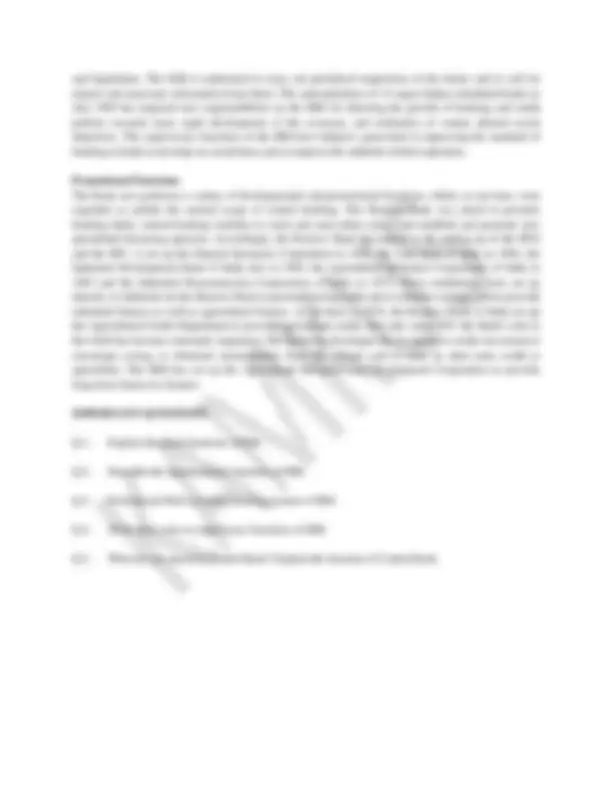
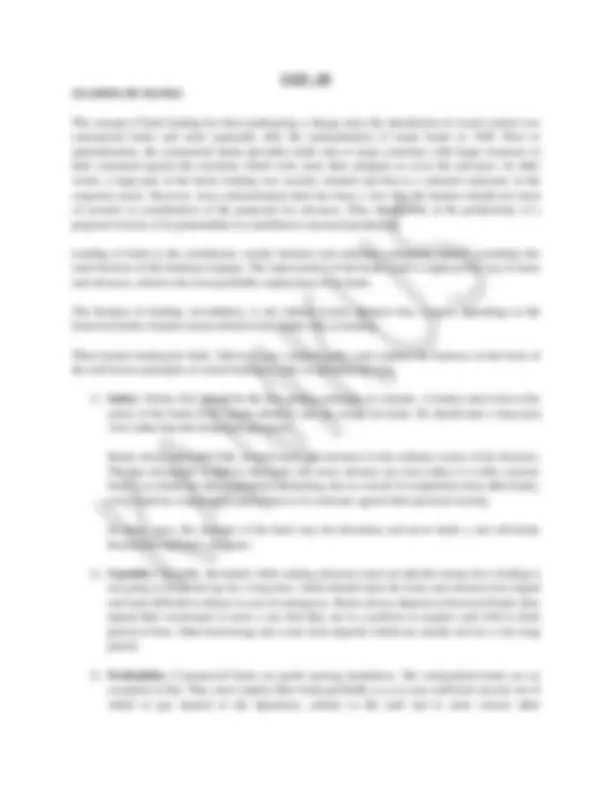
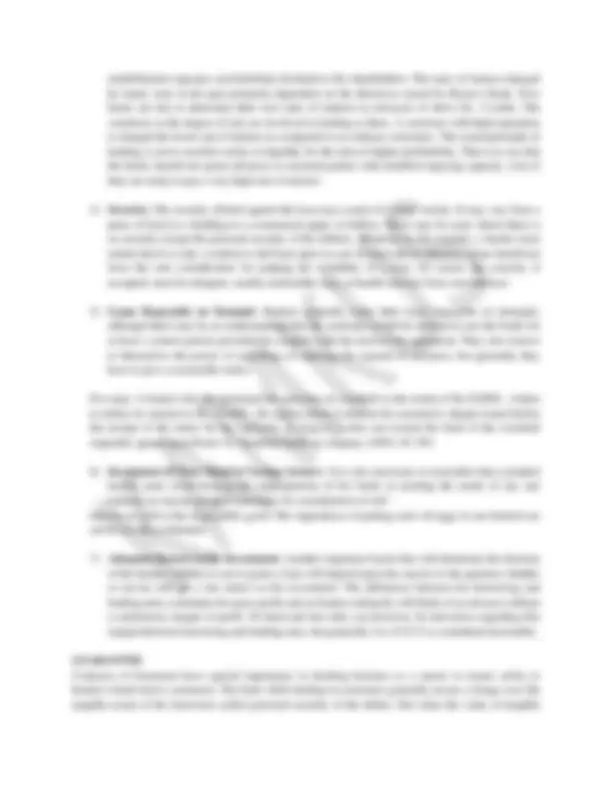
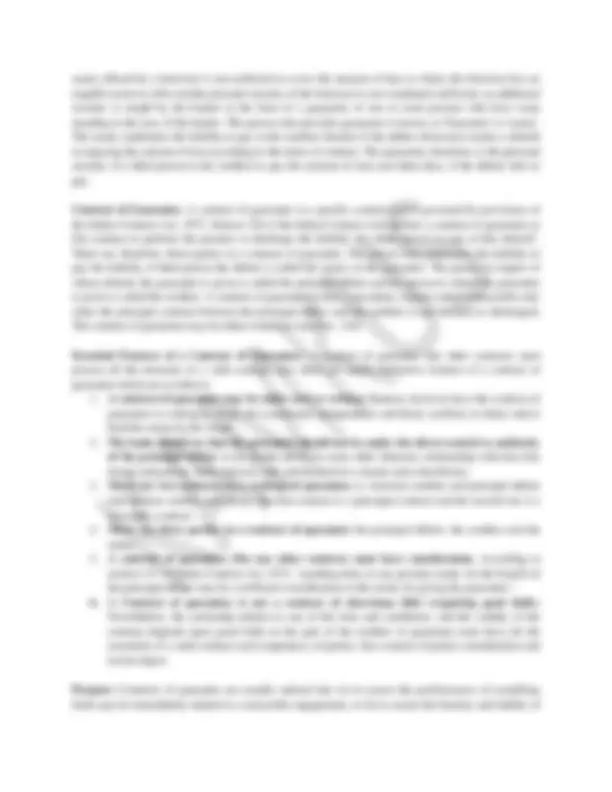
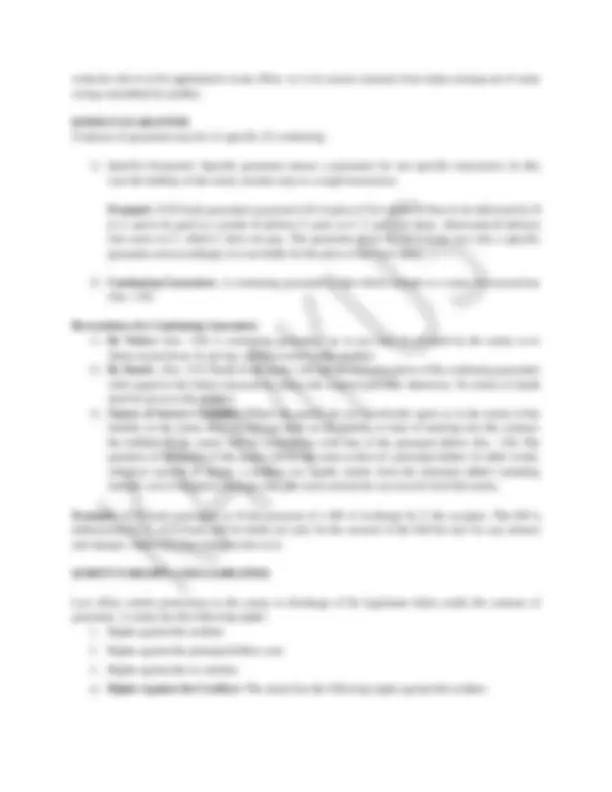
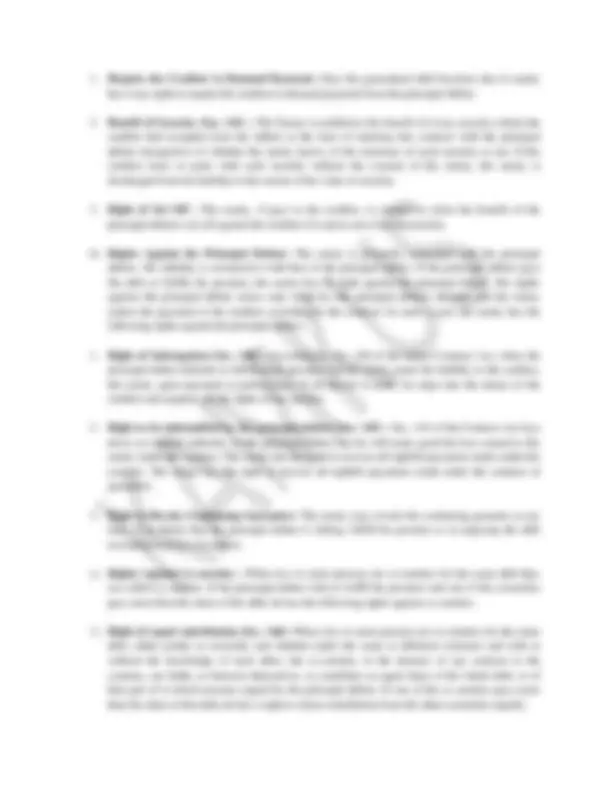
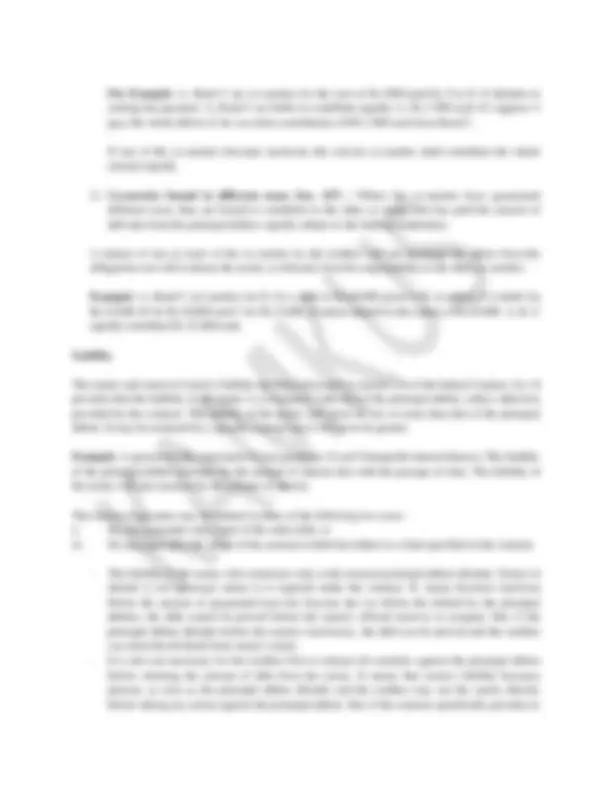
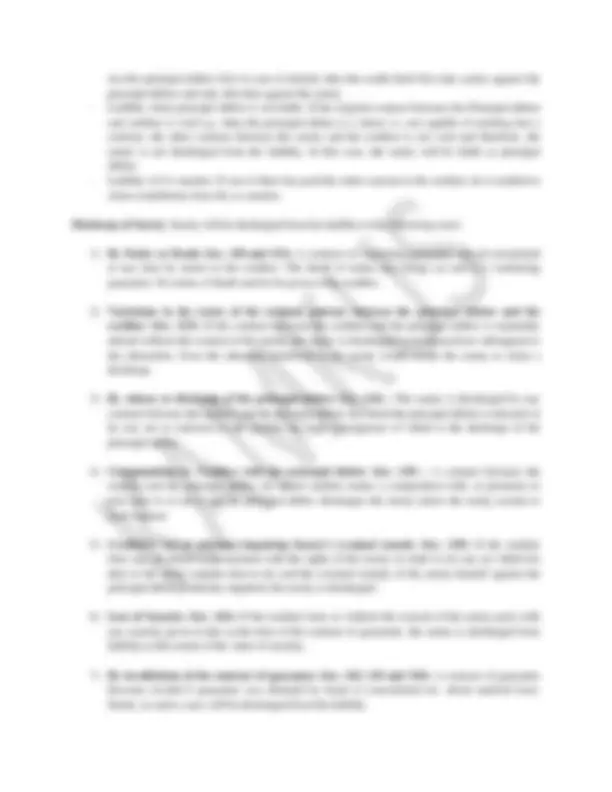
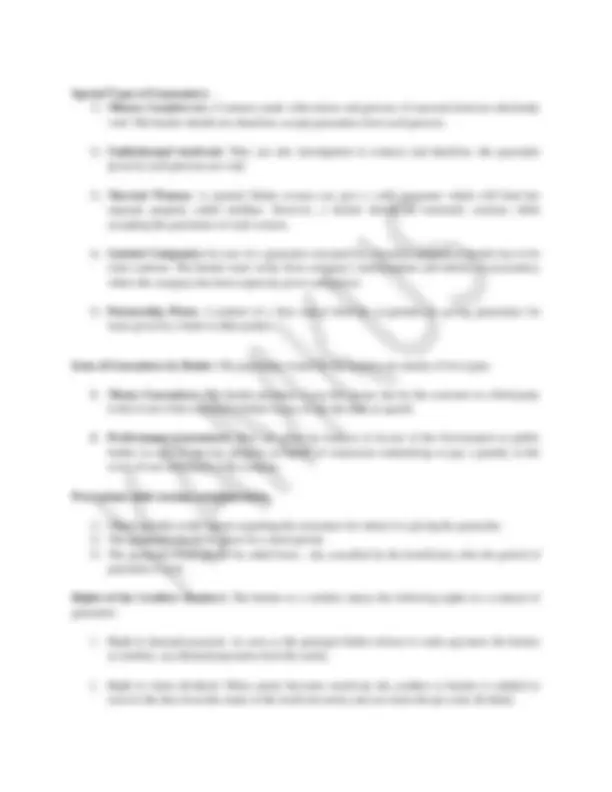
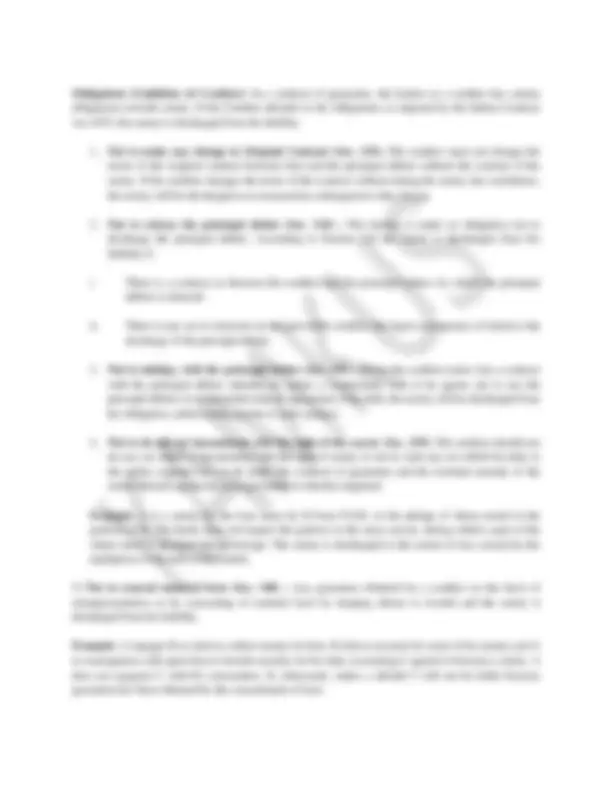
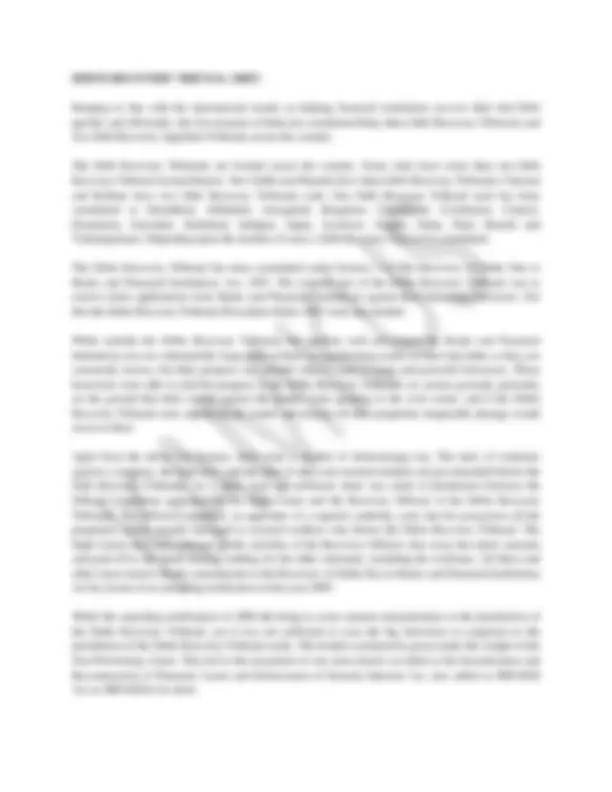
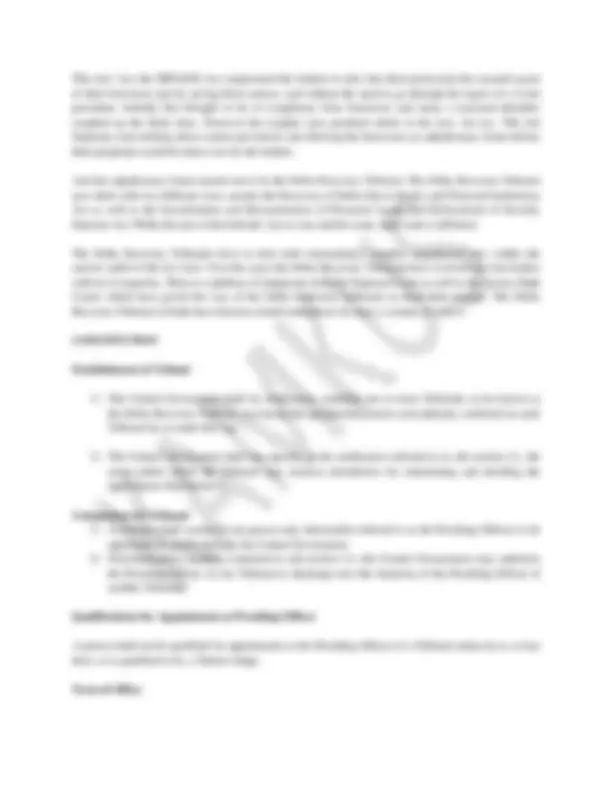
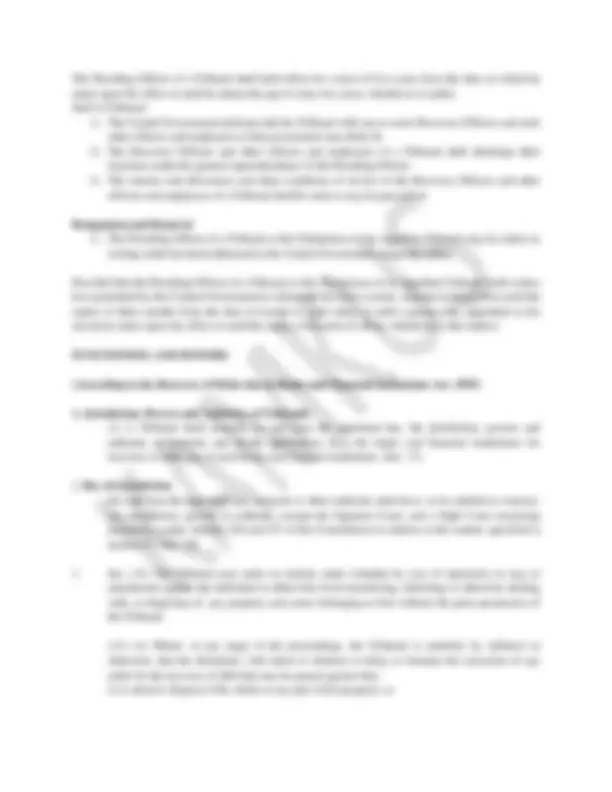
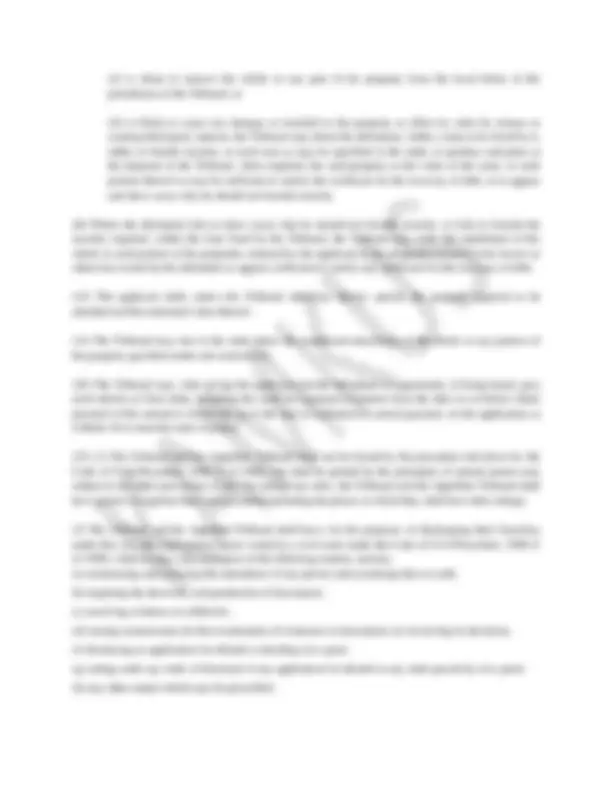

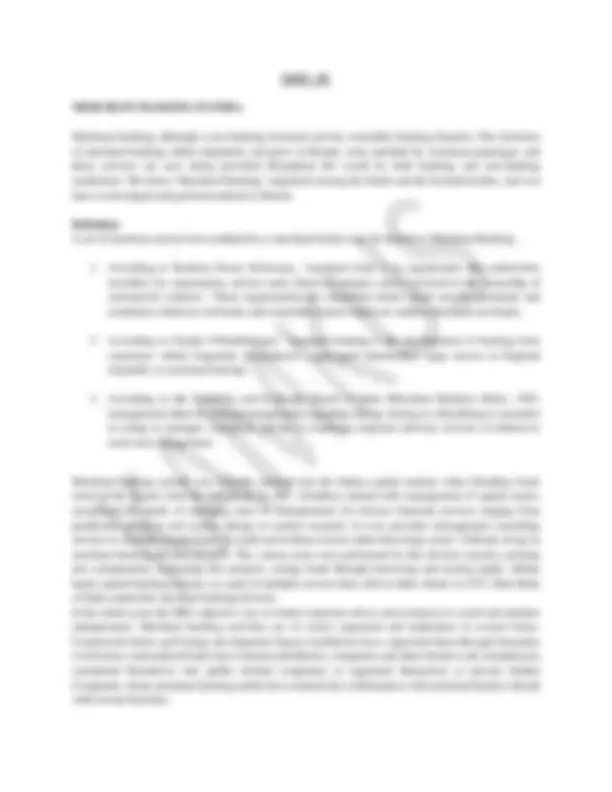
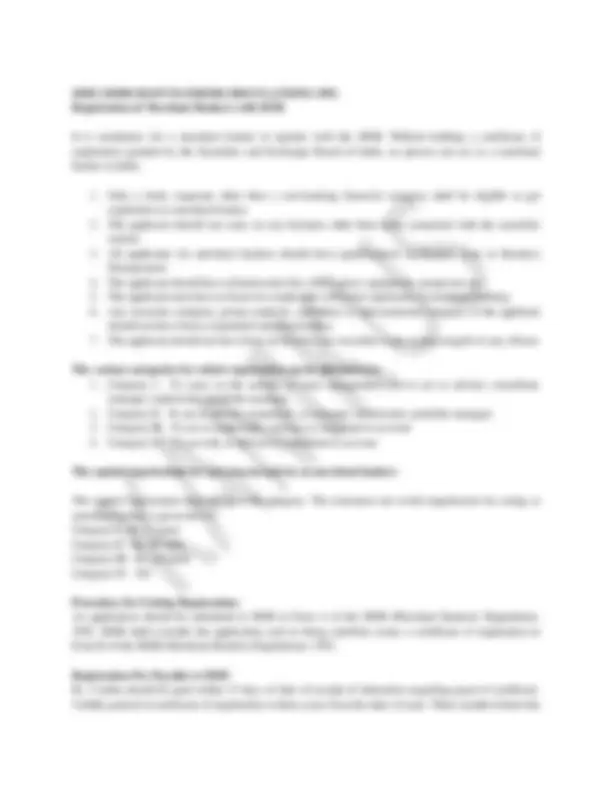


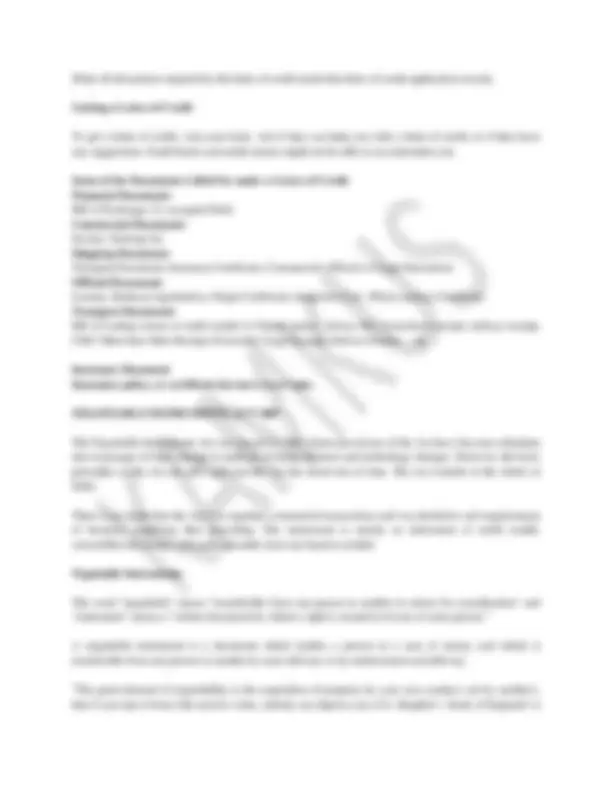
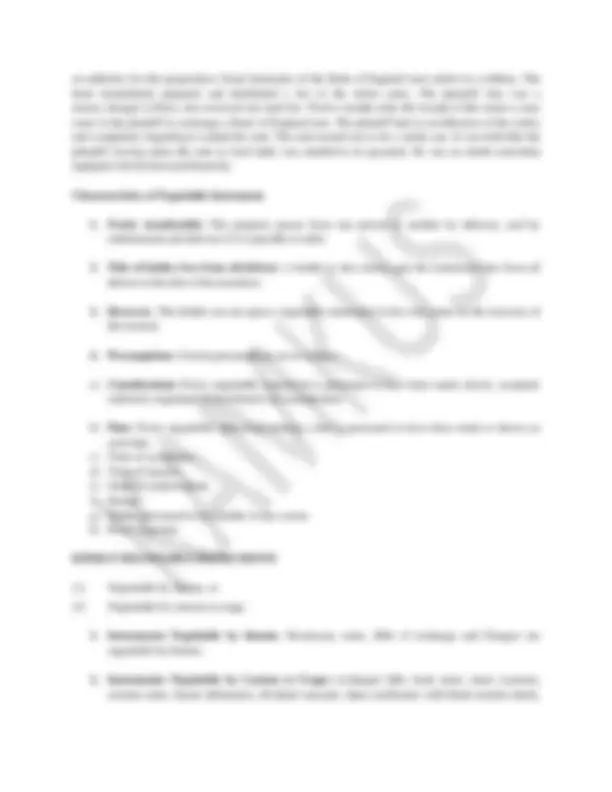

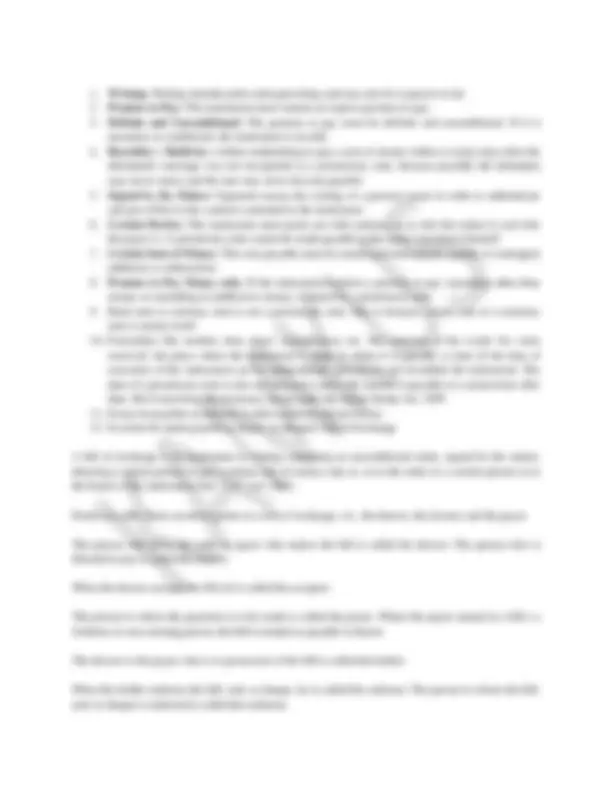
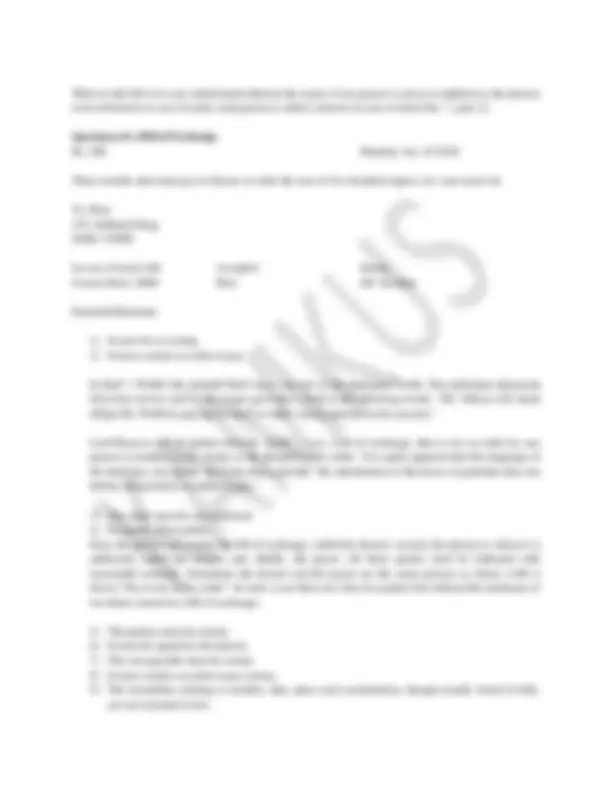
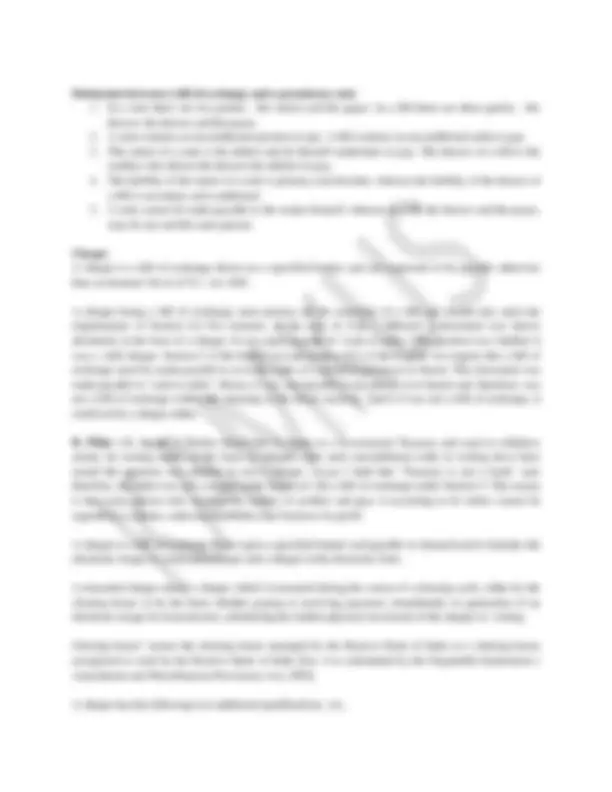
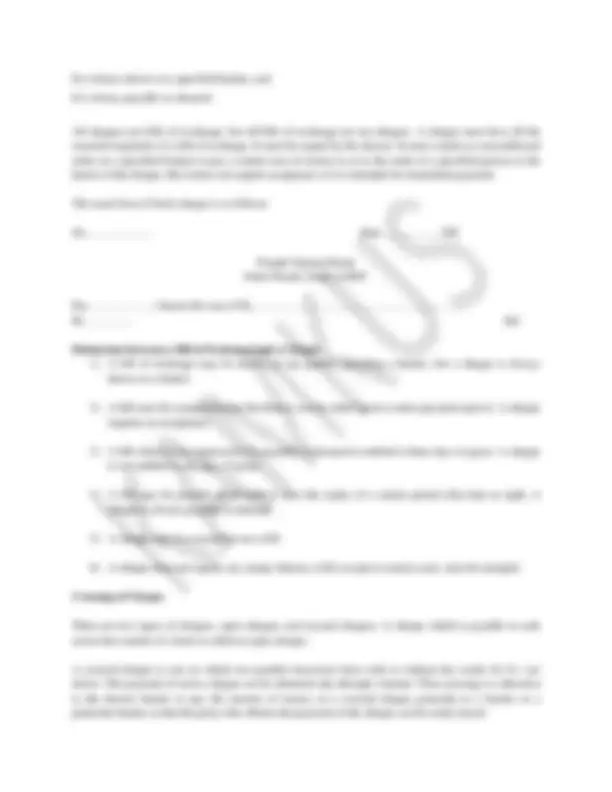
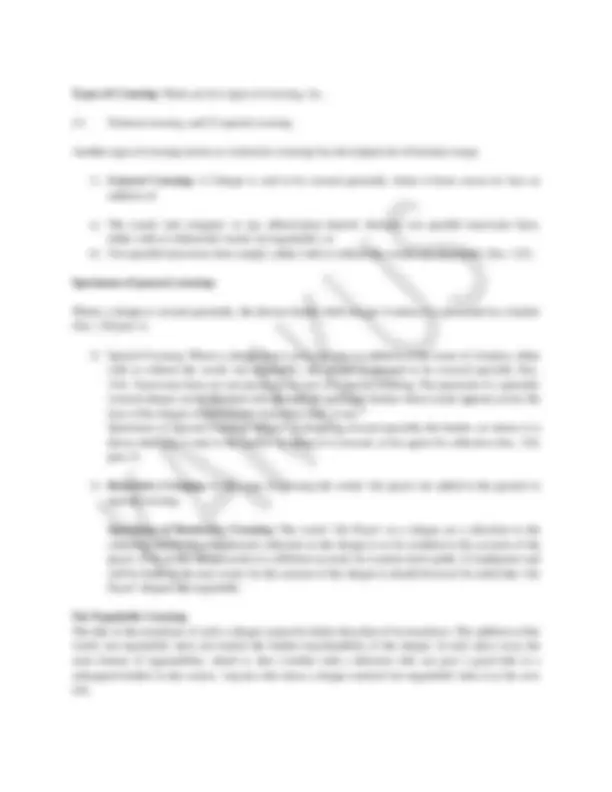
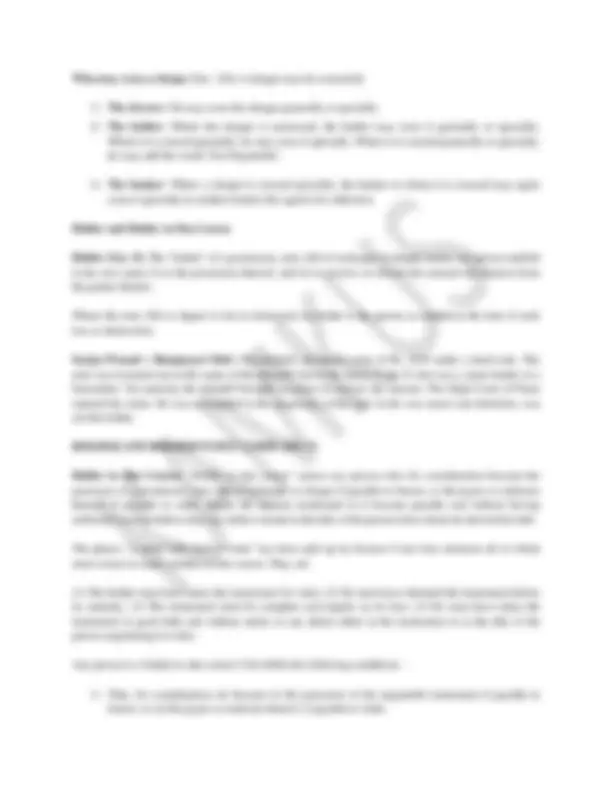
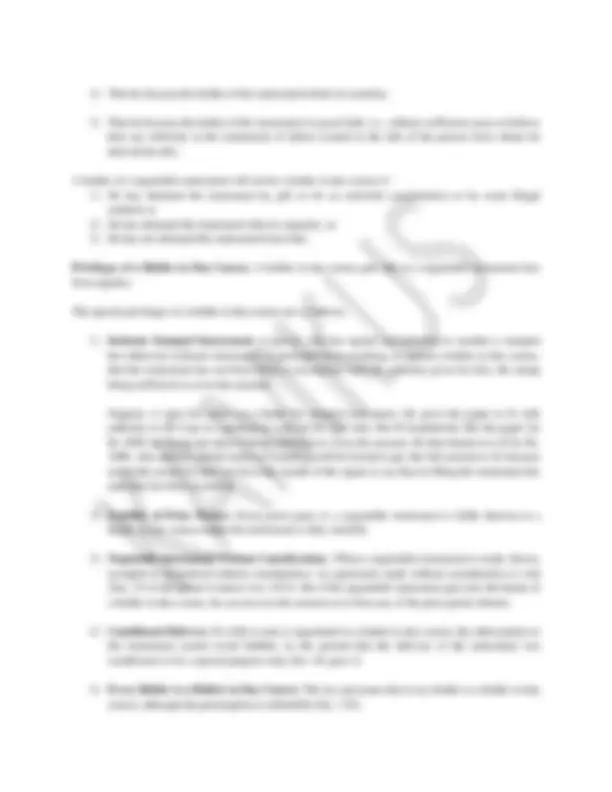
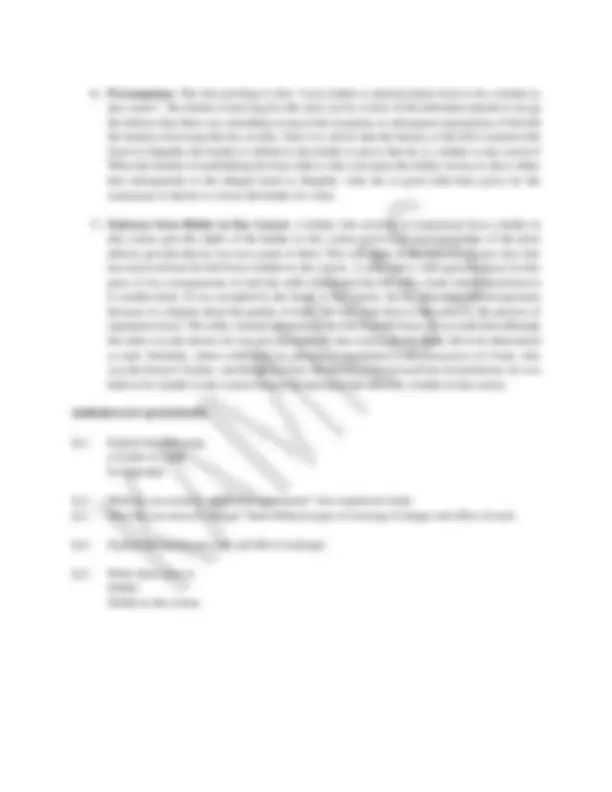
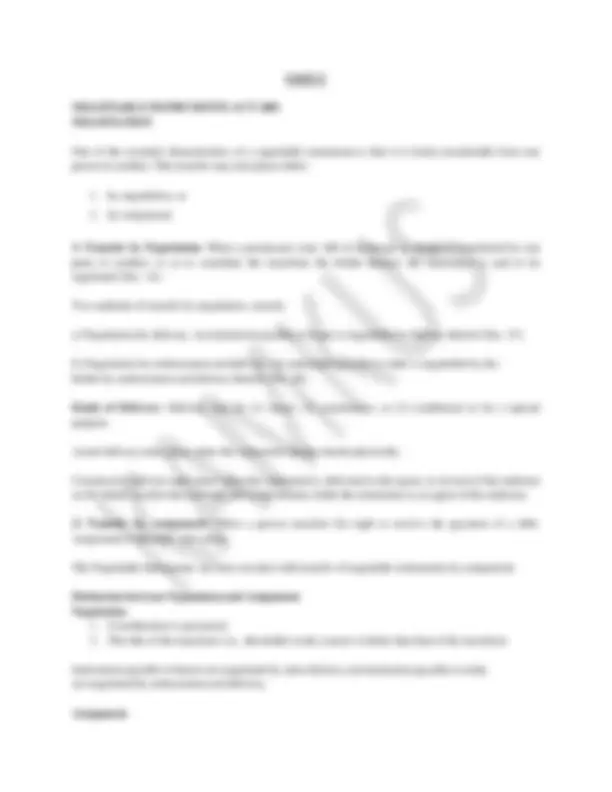
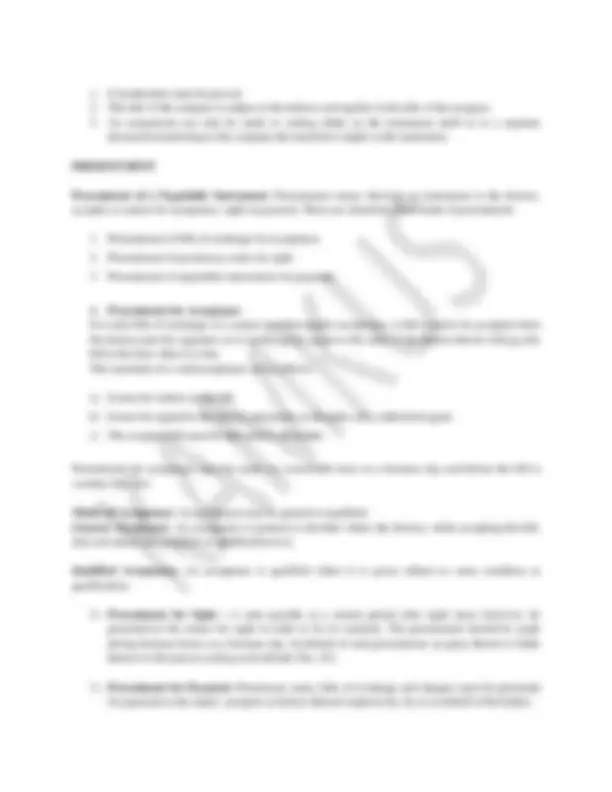
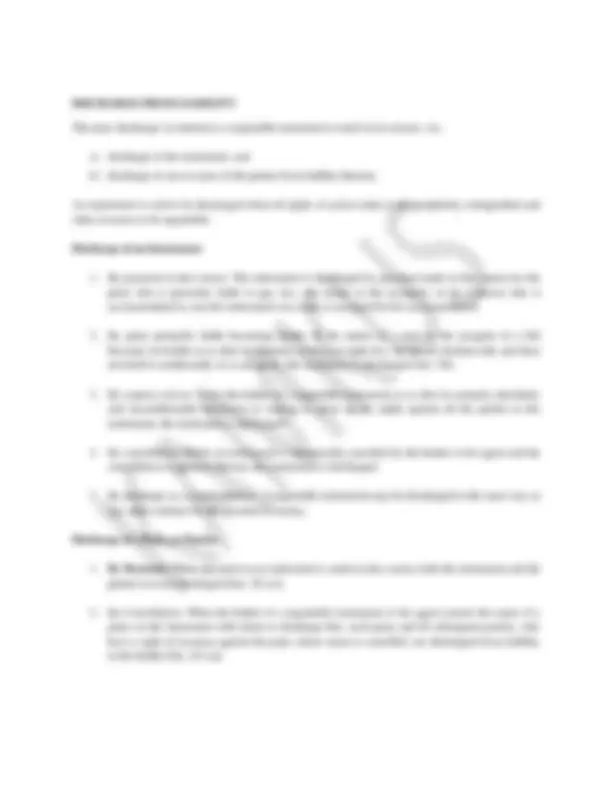

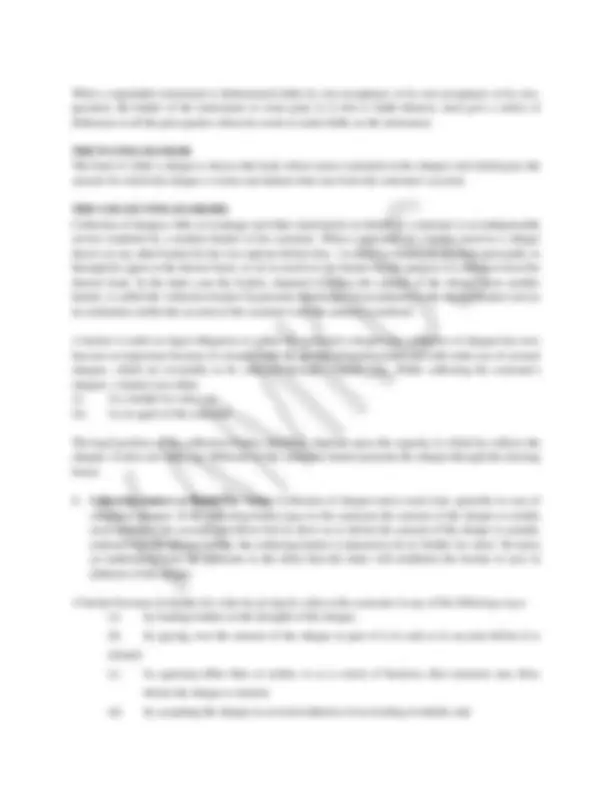
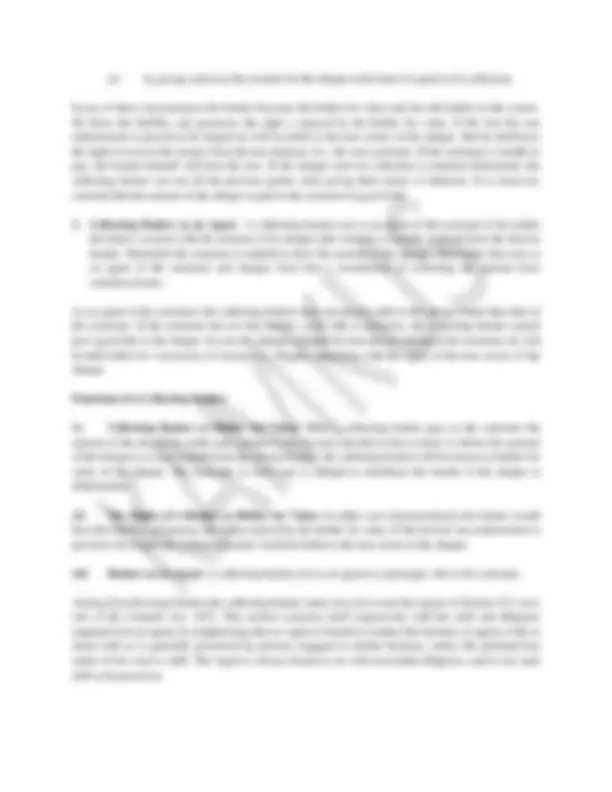
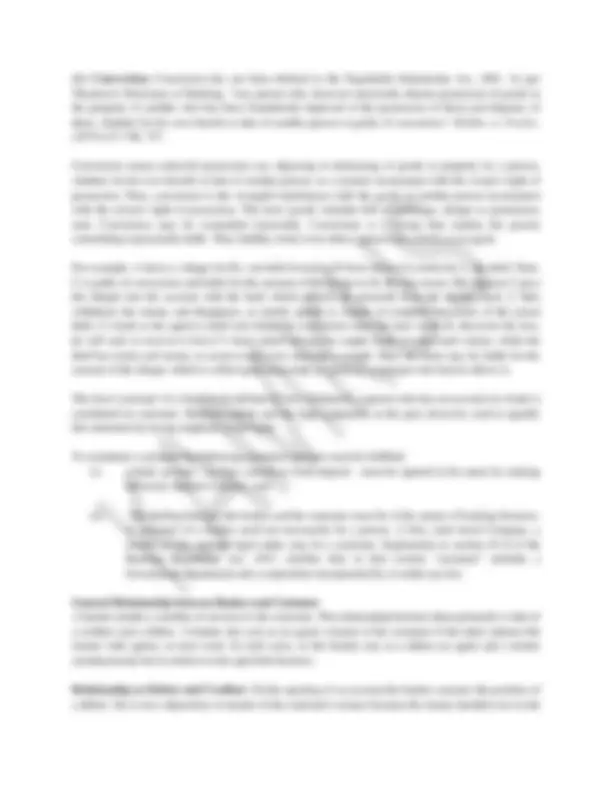
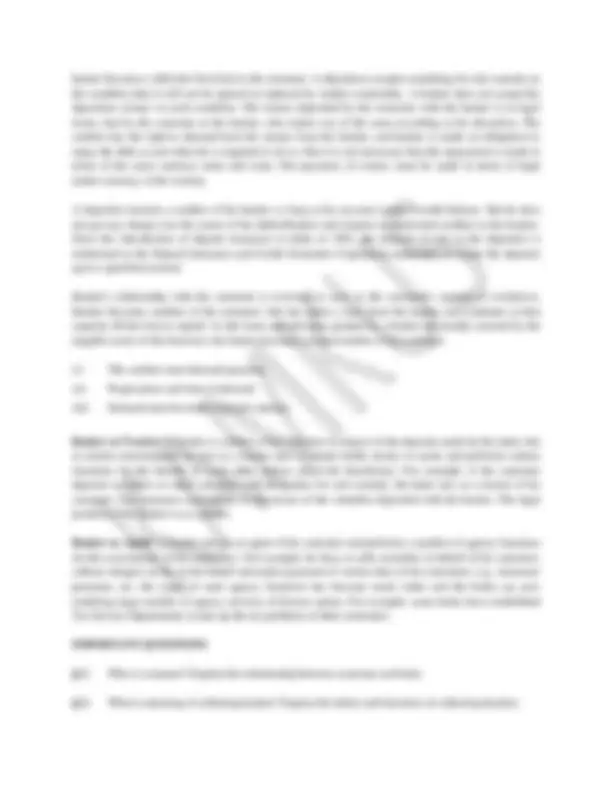



Study with the several resources on Docsity

Earn points by helping other students or get them with a premium plan


Prepare for your exams
Study with the several resources on Docsity

Earn points to download
Earn points by helping other students or get them with a premium plan
Community
Ask the community for help and clear up your study doubts
Discover the best universities in your country according to Docsity users
Free resources
Download our free guides on studying techniques, anxiety management strategies, and thesis advice from Docsity tutors
BANKING LAW AND ITS NEGOTIABLE INSTRUMENT
Typology: Exams
1 / 71

This page cannot be seen from the preview
Don't miss anything!

































































On special offer
Study Material for B. (5Year) –
VIII Semester
Banking Definition Commercial Banks Functions Systems of Banking Unit Banking Branch Banking Group Banking Chain Banking Law Relating to Banking in India The Banking Regulation Act 1949
Important Questions
UNIT -II
Central Bank - Evolution Characteristics Functions of Central Bank The Reserve Bank of India Objectives of RBI Organizational Structure Legal Status and Functions
Important Questions
Lending by Banks Principles of Good Lending Guarantee Kinds of Guarantee Surty's Rights and Liabilities Debt Recovery Tribunals (DRT) Important Questions
Merchant Banking in India SEBI (Merchant Banker) Regulations 1992 Letter of Credit and Defend Guarantee
According to some economists, the word 'Bank' has been derived from the German word 'BANC' which means a joint stock firm. But some other economists say that it has been derived from the Italian word 'BANCO' which means a heap or mound. As the matter of fact, at the time of establishment of Bank of Venice in 1157, the Germans were influential and hence, perhaps the word Banc or 'Banco' was used by Italians to denote the accumulation of securities or money with a joint stock firm which later on with the passage of time came to be known as 'Bank'.
There is still another group of people who believe that the word 'Bank' has been derived from the Greek word 'BANQUE' which means a bench. In the older days, when Jews started their money transactions business as bankers they started using a bench for sitting and if they were not able to pay their obligations, the bench would be broken into pieces and he was taken as Bankrupt. Thus, both the words Bank or Bankrupt are said to have their origin from the word 'Banque'.
Definitions: First of all we discuss the definition given under Banking Regulation Act 1949. Sec. 5 (b) "Banking" means the accepting for the purpose of lending or investment, of deposit of money from public, repayable on demand or otherwise, and withdraw able by cheque, draft, order or otherwise.
According to, Sir John Paget "No person or body, corporate or otherwise, can be a banker who does not (1) take deposit accounts (2) take current account (3) issue and pay cheque and (4) collect cheques, crossed and uncrossed, for his customers."
This definition denotes only the essential feature of Banking company stead of Banking. 'Banking company' means that which transacts the business of banking in India.
Explanation: Any company which is engaged in the manufacture of goods or carries on any trade and which accepts deposits of money from the public merely for the purpose of financing its business; as such manufacturer or trader shall not be deemed to transact the business of banking within the meaning of this clause. (Sec 5c of Banking Regulation Act 1949)
Forms of Business in which banking company may engage:
According to sec 6, the following business may be undertaken by a banking company -
a) The following functions form the bulk of a bank's activities and are called its main functions:
I. The borrowing, raising or taking of money; II. The lending or advancing of money either upon security or without security;
III. The drawing, making, accepting, discounting, buying, selling, collecting and dealing in bills of exchange, hundis, promissory notes, coupons, drafts, bills of lending, railway receipts, warrants,
debentures, certificates, scripts and other instruments and securities whether transferable or negotiable or not;
IV. The granting and issuing of letters of credit, travellers' cheques and circular notes;
V. The buying, selling and dealing in bullion and species;
VI. The buying and selling of foreign exchange including foreign bank notes;
VII. The acquiring, holding, issuing on commission, underwriting and dealing in stock, funds, shares, debentures, debenture stock, bonds, obligations, securities and investments of all kinds;
VIII. The purchasing and selling of bonds, scrips and other forms of securities on behalf of constituents or others;
IX. the negotiating of loans and advances;
X. The receiving of all kinds of bonds, scrips and other forms of securities on behalf of constituents or others;
XI. The providing of safe deposit vaults; and
XII. The collecting and transmitting of money and securities.
b) It may act as an agent of the Government, local authority or person and can carry on agency business but it cannot act as secretary and treasurer of a company.
c) It may contract for public and private loans and negotiate and issue the same.
d) It may effect, insure, guarantee, underwrite, participate in managing and carrying out of any issue of State, municipal or other loans or of shares, stock, debenture stock of companies and may lend money for the purpose of any such issue.
e) It may carry on and transact every kind of guarantee and indemnity business. f) It may manage, sell and realise any property which may come into its possession in satisfaction of its claims.
g) It may acquire and hold and deal with any property or any right, title or interest in any such property which may form the security for any loan or advance.
h) It may undertake and execute trusts.
i) It may undertake the administration of estate as executor, trustee or otherwise.
Accepting of Deposits: Deposits are an important source of a banks funds. They can broadly be classified into three categories.
(a) Savings Deposits: These deposits are of small amounts and are accepted by banks to encourage persons of small means to make savings; frequent withdrawals are not allowed. (b) Fixed Deposits: These deposits are made with the banks for fixed periods specified in advance. They are also known as term deposits.
(c) Current Deposits: These deposits are repayable on demand. The banks undertake the obligation of paying all cheques drawn against these deposits by the customers till they have adequate funds of the customer. The banks usually do not pay any interest in respect of such deposits. These deposits accounts are usually kept by large business houses.
Lending of Money: A major portion of the deposits received by a bank is lent by it. This is also the major source of a bank's income. However, lending money is not without risk and, therefore, a banker must take proper precautions in this process. The lending may be in any of the following forms:
(a) Loan: It is a kind of advance made with or without security. It is given for a fixed period at an agreed rate of interest. The amount of loan is usually credited to the credit of the customer's account who may withdraw from there as per his requirements. The loan may be secured or unsecured.
(b) Cash Credit: It is an arrangement by which a banker allows his customer to borrow money upto a certain limit against security of goods.
(c) Overdraft: It is an arrangement whereby a customer has been allowed temporarily to overdraw his current account. It is without any security.
(d) Discounting and Purchasing of Bills: Time bills are discounted while demand bills are purchased by the banks. In both the cases the banks credit the account of their customers by the amount of bills less any discount or commission charged for such discounting or purchasing of the bills.
Thus, commercial banks render a unique service by tapping savings from a wide spectrum of people and lending to those who really need and use them for various productive purposes. They play an active and not a passive role in the economic development of the country.
Secondary Functions of Commercial Banks
These functions can be classified into the following two categories:
(a)Agency Service: In many cases the commercial banks act as the agents of their customers. As agents they provide the following services:
(i) Collection of drafts, bills, cheques, dividend etc. on behalf of customers.
(ii) Execution of standing orders of the customers viz-payment of subscription, rent, bills, promissory notes, insurance premium etc.
(iii) Conducting stock exchange transactions i.e., purchasing and selling of securities for the customers.
(iv) Acting as a correspondent on representative of customers, other banks and financial corporations.
(v) Functioning as an executor, trustee or administrator of an estate of a customer.
(vi) Preparation of income tax return, claiming of tax refunds and checking of assessments on behalf of the customers. (b) General Utility Services: Commercial banks provide a variety of general utility services viz. issue of letters of credit, travelers cheques, accept valuables for safe custody, acting as a referee as to the respectability and financial standing of the customers, providing specialized advisory services to customer, issue of credit cards, providing of information through regular bulletins about general trade and economic conditions both inside and outside the country etc.
With the opening up of the insurance sectors, banks can now take up insurance business. In the discussion paper issued by the RBI in 1999, it was stated that insurance comes within the scope of universal banking. The term universal banking refers to the combination of commercial banking and investment banking. In other words universal banks refer to those banks that offer a wide range of financial services beyond commercial banking and investment banking such as Insurance. However, as per the guidelines issued by the Reserve Bank of India, banks are not allowed to conduct insurance business departmentally. They cannot also set up separately subsidiary companies for this purpose. However, they can set up joint venture companies for insurance as per government or insurance regulatory and development authority guidelines and with prior permission of Reserve Bank of India.
SYSTEMS OF BANKING UNIT BANKING
Unit banking is a system where the operations of a bank are confined to a single office located in a particular area. A unit bank has virtually no branches. In order to provide facilities to its customers in remittance and collection of funds, a unit bank resorts to correspondent banking system. In case of this system small banks serving small communities place deposits in nearby city banks which in turn hold deposits in giant banks located in giant cities. The gaint banks also hold reciprocal deposits of one another. Consequently, every bank gets connected directly or indirectly with each other and it can safely make payment on behalf of other banks.
Branch Banking is a system where a bank with a network of branches throughout the country carries out its banking operations. Sometimes branches are also opened outside the country. However, small banks may like to restrict their branches or offices to a certain region of the country.
5. Greater Mobility of Capital: Branch banking permits better mobility of capital and thus bring more uniformity in interest rates. Surplus funds can be transferred from one area to another with convenience and speed and thus bring equilibrium in demand and supply of funds resulting in better returns to the investors. 6. Safety of Loans: While lending money, the branches of banks follow the policies as laid down by their Head office. The chances of favouritism are therefore reduced to the minimum. Moreover, loans beyond a particular limit are to be approved by the Head Office as per the prescribed procedure. This all ensured safety of loans and reduces the chances of banks suffering losses due to bad loans. 7. Emergence of Strong and Solvent Banks: Branch banks have large resources, better management; and greater diversification of risk. All this results in emergence of strong and solvent banks. The chances of bank failures are reduced to the minimum.
Disadvantages of Branch Banking: The protagonists of unit banking raise the following objections against branch banking:
Here we have explained the advantages and disadvantage of branch banking versus unit banking. A close perusal of the disadvantages of branch banking show that they are not too serious as they are made out to be. Proper orientation of lending policies, delegation of authority at different levels and proper fixation of priorities can improve the matter. As a matter of fact, branch banking is the logical development of growth of banking industry in any country.
Group Banking and Chain Banking Chain Banking and Group Banking are the outcome of unit banking system devised to avail some of the advantages of branch banking system. They are both common in United State of America.
GROUP BANKING It is a system where two or more banks are controlled by a holding company. Thus, group banking is similar to chain banking except with the difference that instead of an individual or group of individuals or members of family, an incorporated company having a separate legal entity holds majority of the voting power in the companies of the group. Such holding company mayor may not be engaged in the banking business.
CHAIN BANKING
Chain Banking is a system where an individual or group of individuals or members of a family control the operations of two or more banks. The control is exercised either through holding majority of shares in each bank or inter-locking directorships. However, each bank retains its individual entity.
Chain banking or group banking brings the advantages of pooling of resources, economies of scale and reducing idle cash balances etc., to the member banks. However, it has the disadvantages of lack of effective control over member units, and misutilisation of resources of the member units particularly by the holding company. Moreover, it leads to concentration of economic power in a few hands. Due to these disadvantages, the system of chain banking or group banking is considered to be unworthy of adoption.
LAW RELATING TO BANKING IN INDIA THE BANKING REGULATION ACT The Banking Regulation Act came into effect on 16 March, 1949 and applies to the whole of India.
Scheme of the Act: The Banking Regulation Act, 1949 has been divided into the following parts:
Part I Preliminary (Section 1 to SA) Part II Business of Banking Companies (Section 6 to 36A)
Company [See 5(d)]: Company means any company as defined in section 3 of the Companies Act 1956, and includes a foreign company within the meaning of section 591 of that Act. According to section 3 of the companies Act, "company means a company formed and registered under this Act or an existing company".
'Demand' and 'Time' Liabilities [Sec. 5(f)]: 'Demand' liabilities means liabilities which must be met on demand, and 'Time' liability means liabilities which are not demand liabilities.
Secured Loan or Advance [Sec. 5(n)] : 'Secured loan or advance' means a loan or advance made on the security of assets the market value of which is not at any time less than the amount of such loan or advance and "unsecured loan or advance" means a loan or advance not so secured.
Banking may engage in the following forms of business (Sec. 6)
a) The main functions of a bank include: i) Borrowing raising or taking up of money. ii) Lending or advancing secured or unsecured loan iii) The drawing, making, accepting, discounting, buying, selling, collecting and dealing in negotiable instruments. iv) The granting and issuing of letters of credit, travellers cheques and circular notes. v) Providing of safe deposit vaults. vi) Negotiating of loans and advances.
b) Acting as an agent for any government or local authority or any other person or persons.
c) It may carry on and transact every kind of guarantee and indemnity business.
d) It may carry on any other form of business which the central government may, by notification in the official gazette, specify as a form of business in which it is lawful for a banking company to engage.
Requirements as to Minimum Paid up Capital and Reserves (Sec. 11): As per the amendment in 1961, a banking company commencing business after the coming into force of the Banking Companies (Amendment) Act, 1962, shall have a paid up capital of not less than RS.5 lakhs irrespective of the number of places of its business.
A banking company incorporated outside India shall deposit with the Reserve Bank either in cash or in the form of unencumbered approved securities or partly in cash and partly in the form of such securities:
i) An amount which shall not be less than the minimum required as above. ii) As soon as may be after the expiration of each calendar year, an amount calculated at 20% of its profit for that year in respect of all business transacted through its branches in India, as disclosed in the profit and loss account prepared with reference to that year under section 29.
Reserve Fund (Sec. 17) : Every banking company incorporated in India is required to transfer at least 20% of its profits of each year, prior to the declaration of dividend to the Reserve fund.
Management and Control Restrictions regarding Employment of Managerial Personnel; Restrictions on certain forms of Employment (Sec. 10)
A banking company shall not employ or continue the employment of any of the following persons: i) Who is or at any time has been adjudicated insolvent or has suspended payment or has compounded with his creditors, or who is or has been convicted by a criminal court of an offence involving moral turpitude.
ii) Whose remuneration or part of whose remuneration takes the form of commission or of a share in the profits of the company. However, the above provision shall not apply to the payment by a banking company of:
a) any bonus in pursuance of settlement or award arrived at or made under any law relating to industrial disputes or in accordance with any scheme framed by such banking company or in accordance with the usual practice prevailing in banking business.
b) Any commission to any broker, cashier, contractor, clearing and forwarding agent, auctioneer or any other person, employed by the banking company under a contract otherwise than as a regular member of the staff of the company.
iii) Whose remuneration is, in the opinion of the Reserve Bank, excessive.
iv) A banking company shall not be managed by a person
v) Who is Director of any other company; or
vi) Whose term of office as a person managing the company is for a period exceeding 5 years at one
time.
Provided that, the term of office of any such person may be renewed or extended by further periods not exceeding 5 years on each occasion, subject to the condition that such renewal or extension shall not be sanctioned earlier than 2 years from the date on which it is to come into force.
Constitution of Board of Directors (Sec. 10A): It provides that not less than 51 % of the total number of members on the Board of Directors of a banking company shall consist of persons who satisfy the following conditions:
i) Accountancy
ii) Agriculture and rural economy
ii) The management of whole of affairs of such a banking company shall be trusted to a managing director who shall exercise his powers subject to the superintendence, control and direction of the Board of Directors.
A whole time chairman or a managing director of a banking company shall hold office for such period not exceeding 5 years as the Board of Directors may fix. However, he shall be eligible for re- election or re-appointment.
A person shall be disqualified for being a whole time chairman or a managing director of a banking company if he:
a) is a director of any company other than (i) a company which is subsidiary of the banking company, (ii) a company registered u/s 25 of the Companies Act. b) is a partner of any firm which carries on any trade, business or industry, or c) has substantial interest in any other company or firm, or d) is a director, manager, partner or proprietor of any trading, commercial or industrial concern, or e) is engaged in any other business or vocation.
Prohibition of Common Directors (Sec. 16): A banking company incorporated in India:
a) cannot have as a director in its board of directors any person who is a director of any other banking company, and
b) cannot have in its board of directors more than 3 directors who are directors of companies which among themselves are entitled to exercise voting rights in excess of 20% of the total voting rights of all the share holders of that banking company.
Loans and Advances Restrictions on Loans and Advances (Sec. 20): A banking company shall not: a) grant any loans or advances on the security of its own shares, or b) enter into any commitment for granting any loan or advance to on behalf of i) any of its director ii) any firm in which any of its directors in interested as partner, manager, employee or guarantor, or iii) any individual in respect of whom any of its directors is a partner or guarantor.
Remission of Debts (Sec. 20A): A banking company cannot, except with the approval of the Reserve Bank remit in whole or in part any debt due to it by :
a) Any of its directors, or b) any firm or company in which any of its directors is interested as director, partner, managing agent on guarantor, or c) any individual if any of its directors is his partner or guarantor.
Assets of a Banking Company
Maintenance of Liquid Assets (Sec. 24): Every banking company is required to maintain in India in cash, gold or unencumbered approved securities, valued at a price not exceeding the current market price, an amount which shall not at the close of business on any day be less than 25% of the total of its time and demand liabilities in India.
This is known as statutory liquidity ratio (SLR). The Resene Bank has the power to increase this ratio up to 40% and thus compel the banking company to maintain a larger portion of their liabilities in liquid form.
Assets in India (Sec. 25): The assets in India of every banking company at the close of business on the last Friday of every quarter or, if that Friday is a public holiday under the Negotiable instruments Act, 1881, at the close of the business on the preceding working day, shall not be less than 75%, of its demand and time liabilities.
Monthly Returns [Section 27(1)]: Every banking company is required to submit to the Reserve Bank before the close of the month succeeding that to which it related, a return in the prescribed form and manner showing its assets and liabilities in India at the close of business on the last Friday of every month or if that Friday is a public holiday under the Negotiable Instruments Act, 1881, at the close of the business on the preceding working day.
Powers of the Reserve Bank
a) What the company is or will be in a position to pay its present or future depositors in full as they become due b) That the affairs of the company are not being, or are not likely to be conducted in a manner detrimental to the interest of the depositors. c) In the case of a company incorporated outside India that the carrying on of banking business by such company in India will be in the public interest and that the government or law of the country
c) to prevent the affairs of any banking company being conducted in a manner detrimental to the interest of the depositors or in a manner prejudicial to the interests of the banking company;
9) Power of Reserve Bank to appoint additional directors (Sec. 36AB) : The Reserve Bank, if considers necessary for the protection of the interest of depositors, from time to time may appoint additional directors but the number should not exceed five or one third of the maximum strength fixed for the Board by the articles whichever is less. Additional directors shall hold office at the pleasure of the Reserve bank not exceeding three years at a time.
10) Power of Reserve Bank to remove managerial and other persons from office (Sec. 36AA): For preventing the affairs of the banking company, the Reserve bank may remove any director, chief executive officer by writing an order the order shall contain reasons for his removal and the date from which it is effective. Reasonable opportunity should also be given to such a person for explaining his position before such order is actually passed against him. Such person, within 30 days, can appeal to central government.
Further powers and functions of the Reserve Bank (Sec. 36)
a) It may on a request being made, assist in a proposal for the amalgamation of banking companies concerned. b) It may assist any banking company by means of the grant of a loan or advance to it. c) It shall make an annual report to the central government on the trend and progress of the banking in the country. It shall also include in such report its suggestions for the strengthening of banking business throughout the country.
Accounts and Audit Profit and Loss Account and Balance Sheet (Sec. 29): At the expiration of each calendar year or at the expiration of a period of 12 months ending with such date as the central government may, by notification in official gazette specify in this behalf, every banking company incorporated outside India, in respect of all business transacted through its branches in India, shall prepare with reference to that year or the period, as the case may be a balance sheet and a profit and loss account as on the last working day of the year of the period in the forms set out in the third schedule or as near thereto as circumstances admit :
The balance sheet and profit and loss account shall be signed:
a) In the case of a banking company incorporated in India, by the manager or the principal officer of the company and where there are more than three directors of the company, by at least three of those directors, or where there are not more than three directors, by all the directors, and
b) In the case of a banking company incorporated outside India, by the manager or principal officer of the company in India.
Audit of Bank Accounts (Sec. 30) : According to Sec. 30, the balance sheet and profit and loss account prepared in accordance with Sec. 29 shall be audited: a) In the case of a banking company incorporated in India, by a person duly qualified under any law for the time being in force to be auditor of companies;
b) In the case of banking company incorporated outside India, either by such an auditor as aforesaid or by a person duly qualified to be an auditor under the law of the country in which the company is incorporated.
Submission of Returns (Sec. 32) : The profit and loss account and balance sheet together with the auditor's report shall be published in the prescribed manner and three copies thereof shall be furnished as return to the Reserve Bank within 3 months from the last day of the period to which they refer. This period may, however, be extended by the Reserve Bank by a further period not exceeding 3 months. Three copies of the profit and loss account and balance sheet together with auditors report shall also be sent by the banking company to the registrar or companies at the same time when it sends them to the Reserve bank.
Display of Audited balance sheet by Companies incorporated outside India (Sec. 33): Every banking company incorporated outside India is required not later than the first Monday in August of every year in which it carries on business, to display in a conspicuous place in its principal office and in every branch office in India a copy of its last audited balance sheet and profit and loss account prepared u/s 29.
Production of Document of Confidential Nature (Sec. 34A): A banking company cannot be compelled by any authority before which any proceedings under the industrial Disputes Act, 1947 are pending to produce any document or furnish or disclose any statement or information which is of a confidential nature and the production furnishing or disclosure of which would result in disclosure of information relating to:
a) any reserves not shown in its published balance sheet; or b) any particulars not shown therein in respect of provisions made for bad and doubtful debt and other usual or necessary provisions.
Acquisition of Banking Companies (Sec. 36AC): This section gives power to the central government to acquire the undertaking of a banking company. It provides that if on receipt of a report the central government is satisfied that a banking company.